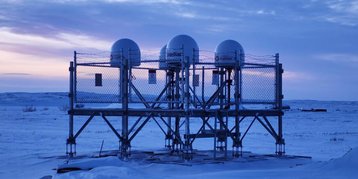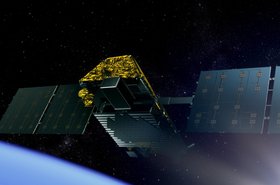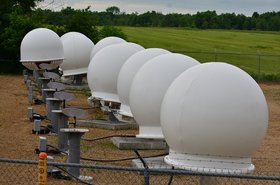Arctic Space Technologies (AST) is to host a OneWeb ground station at its facility in Piteå, Sweden.
The company announced this week that a OneWeb Satellite Network Portal (SNP) will be constructed at the AST Space Centre in the Öjebyn area of the town in northern Sweden.
The companies signed an agreement in December of 2022, and have now finalized the detailed design work as well as obtained all approvals for the construction of the SNP.
The deal will see 27 satellite tracking antenna systems installed that are expected to be operational in Q3 2023.
Stephen Graham, OneWeb director for SNP site management, said: “We are delighted to partner with Arctic Space Technologies to construct a satellite network portal in Northern Sweden. Alongside the completion of our global LEO constellation, the development of a distributed and sophisticated ground infrastructure is critical for OneWeb to deliver connectivity for customers across a range of sectors.”
Benjamin Fischer, CEO of Arctic Space Technologies, added: “It comes naturally that we work together with a company like OneWeb to support with sustainable hyper-scale satellite data processing capabilities to meet their rapidly growing demand for network bandwidth. We are happy to be able to share the benefits of northern Sweden with partners like OneWeb, and I look forward to our future work together that will not only be of great benefit for both parties but also align space activities with the European Green Deal.”
Arctic Space Technologies operates another ground station facility next to and connected to a data center operated by EcoDataCenter. The Swedish ground station facility was built in 2021.
AST partnered with EcoDataCenter in June 2020 to locate and connect ground station infrastructure to the latter’s Piteå facilities. The data centers – acquired as part of a merger with Fortlax in 2019 – comprise two hydroelectric-powered buildings and a second EMP-protected site in the area. The company’s footprint in the city totals 3,250 sqm (35,000 sq ft) and 4.5MW.
Last year Viasat launched a new ground station at Arctic Space’s Piteå site. The deployment consists of four Viasat full-motion 7.3-meter S/X/Ka-band antennas and the associated infrastructure.
OneWeb, which is undergoing a merger with Eutelsat, is developing more than 40 ground station sites to manage its 600-strong satellite fleet, with around 22 thought to be in development in 2020 at the time of its bankruptcy. By the end of 2022, the company said its ground network included coverage of the UK, Northern Europe, Alaska, Canada, Greenland, Iceland, and Arctic seas.
Last week the company signed an agreement with the Swedish Space Corporation to deploy a Canadian ground station in Yellowknife, in the Northwest Territories.
The company is also set to deploy a ground station off the coast of Africa on the island of St. Helena in partnership with local telco Sure.
Earlier this year OneWeb inaugurated its new SNP at Telespazio’s teleport in Maricá in Brazil. It is reportedly one of two gateways in Brazil and one of seven across Latin America.
Other deals have been signed with Paratus in Luanda, Angola, and Vivacom in Bulgaria. In 2021 the satellite company announced plans to build a ground station in Kazakhstan.
In other satellite news
- The FCC has given the green light to Viasat’s $7.3 billion merger with Inmarsat. UK regulator the CMA gave the deal its blessing after a long probe. The European Commission is also investigating the deal.
- Inmarsat, in the meantime, has ordered three small L-band GEO sats from 3D printing specialist Swissto12 for a launch in 2026. The I-8 machines will be based on Swissto12’s HummingSat platform and will boost the operator’s safety services. Inmarsat has also partnered with IoT solutions provider FreeWave as a distribution partner for its L-band satellite IoT services.
- Starlink is now available in Panama, and Italian insurance firm Unipol Gruppo has purchased a number of Starlink terminals to help with rescue and recovery efforts in flood-stricken areas of the country.
- Satellite operator ABS has signed Cyprus’ Cyta as a new teleport partner. ABS has successfully migrated its Telemetry, Tracking, and Control (TT&C), and monitoring services from its Bahrain teleport to the Makarios teleport in Cyprus.
ABS operates a fleet of five satellites; ABS-2, ABS-2A, ABS-3A, ABS-4/Mobisat-1, and ABS-6. Government-owned Cyta is a major telecommunications provider in Cyprus.
- The National Geospatial-Intelligence Agency is working with NASA to develop a positioning and navigation system for the Moon to support future lunar missions.
- Tonga’s underwater volcanic eruption last year was so powerful it disrupted radio communications in orbit by creating plasma bubbles in the ionosphere.







